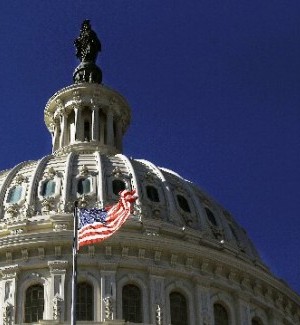The number of organisations engaged in religious lobbying or religion-related advocacy in Washington DC has increased roughly fivefold in the past four decades, from fewer than 40 in 1970 to more than 200 today.
This is the finding of a new study on religious advocacy groups released today by the Pew Research Center's Forum on Religion & Public Life.
Religious groups collectively employ at least 1,000 people in the greater Washington area and spend at least $390 million a year on efforts to influence national public policy. As a whole, religious advocacy organisations work on about 300 policy issues.
For most of the past century, religious advocacy groups in Washington focused mainly on domestic affairs. Today, however, roughly as many groups work only on international issues as work only on domestic issues, and nearly two-thirds of the groups work on both, says Pew.
These are among the key findings of 'Lobbying for the Faithful: Religious Advocacy Groups in Washington, DC', which examines a total of 212 religion-related advocacy groups operating in the nation's capital.
Other major findings include:
• About one-in-five religious advocacy organisations in Washington have a Roman Catholic perspective (19 per cent) and a similar proportion is evangelical Protestant in outlook (18 per cent), while 12 per cent are Jewish and eight percent are mainline Protestant. But many smaller US religious groups, including Baha'is, Buddhists, Hindus, Muslims and Sikhs, have also established advocacy organisations in the Washington area. In fact, the number of Muslim groups (17) is about the same as the number of mainline Protestant groups (16). And the largest category today is interreligious: One-quarter of the groups studied (54) either represent multiple faiths or advocate on religious issues without representing a specific religion.
• The median annual advocacy expenditures by the 131 groups for which recent (2008 or 2009) financial data were available was nearly $1 million. More than one-third of the groups (46 groups, or 35 per cent) reported annual advocacy expenditures between $1 million and $5 million per year, while about one-in-ten (18 groups, or 14 per cent) reported spending more than $5 million a year.
• The recession in the U.S. economy from late 2007 to mid-2009 seems to have taken a toll on the budgets of many religion-related advocacy organisations. Of the 104 groups for which data on expenditures in both 2008 and 2009 were available, 56 reported that their advocacy spending was lower in 2009 than it had been in 2008. The average decline for the 56 groups was about $500,000. In the same period, 48 groups reported that their advocacy spending rose, with the average increase being about $300,000. Overall among the 104 groups, there was a net drop of about $14 million in total advocacy expenditures during this period.
• The issue agendas of religious advocacy groups touch on a wide array of domestic and foreign policy concerns. On the domestic front, the most commonly addressed issues are the relationship between church and state, the defence of civil rights and liberties for religious and other minorities, bioethics and life issues (such as abortion, capital punishment and end-of-life issues) and family/marriage issues (such as the definition of marriage, domestic violence and fatherhood initiatives).
• Internationally, the most commonly addressed concerns are human rights, debt relief and other economic issues, and the promotion of peace and democracy. About one-in-five groups (21 per cent) deal with religious freedom in particular countries or worldwide.
• More than eight-in-ten of the groups say they use targeted or mass emails to mobilise constituents. More than six-in-ten were using social networking tools such as Facebook and Twitter in 2009.
• More than three-quarters (79 per cent) of the groups for which staffing data were available employ 12 or fewer people in the Washington area. More than half (55 per cent) have five or fewer employees.
The full report — including a brief history of religious advocacy in Washington — is available on the Pew Forum's website (http://www.pewforum.org/). In addition, an online directory (http://projects.pewforum.org/religious-advocacy/) includes profiles of the 212 religious advocacy groups in the study, as well as excerpts from their mission statements and financial data, where available.
The Pew Research Center's Forum on Religion & Public Life conducts surveys, demographic analyses and other social science research on important aspects of religion and public life in the US and around the world.
As part of the Washington-based Pew Research Center, a nonpartisan, nonadvocacy organisation, the Pew Forum does not take positions on policy debates or any of the issues it covers.
[Ekk/3]
